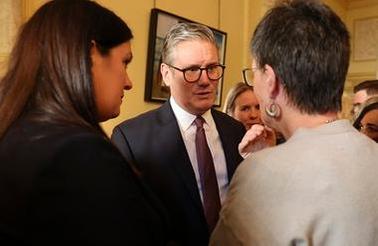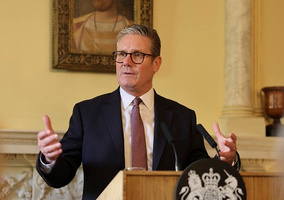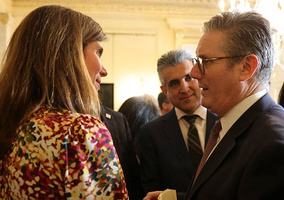Civil society lives in tension – between proximity and protest, influence and independence. The government’s proposed Civil Society Covenant invites us to reflect on where we stand in relation to the state, and how we hold that position with integrity.
I often use a tent analogy. There are four positions charities might take:
- Inside the tent, holding it up – a tent pole, stabilising and central.
- Inside, shaping the agenda – a co-creator, influencing from within.
- Just outside – in relationship but freer to challenge.
- In another field altogether – radical, principled, and out of reach.
At Mind, we move between these positions but avoid staying too long in positions one and two, and we are always looking for a more vibrant pitch. As a national charity with local roots, our scale brings both opportunity and obligation. We collaborate and we critique, sometimes in the same day.
The covenant aspires to formalise partnership between government and the sector. That sounds hopeful. But the real test will be in how it holds under pressure – especially when we speak truth to power.
A tapestry, not a hierarchy
The truth is, the sector is beautifully varied. It spans grassroots mutual aid groups run on love and WhatsApp, all the way to national federated organisations like Mind – with strategic infrastructure, fundraising teams, policy experts, and national visibility.
This isn’t a hierarchy. It’s a tapestry. And every thread matters.
But we do have to be honest: the resources available across that tapestry are not equal. And that inequality shapes how organisations engage with government – both nationally and locally.
Large charities often have the staff capacity, data, brand recognition, and networks to contribute to consultations, navigate procurement systems, and shape policy. Smaller organisations may be closer to the coalface, deeply embedded in communities, but shut out of influence due to bandwidth, bureaucracy, or sheer exhaustion.
Neither model is better. Both are necessary. But the covenant must be honest about this landscape if it’s going to be credible. It must make space for difference – and commit to levelling the playing field, not simply handing megaphones to the most resourced.
At Mind, we’re taking a hard look at this within our own federation. It’s not enough to be a well-meaning national body – we have to be an equitable one. We must ask hard questions about how power, voice, and value flow across our network, and what we need to change to live up to our mission of justice in mental health. This kind of reflection should sit at the heart of the covenant, even if it’s not written in.
The compromise dilemma
There’s also the question of compromise. National charities can afford to be patient. We can negotiate, stay at the table, and push for change over time.
But the people we serve can’t. There’s no compromise when you’re on a two-year waiting list. No negotiation when your benefits are cut and you’re choosing between rent and food. No gradualism when discrimination defines your daily life.
So when we enter policy spaces, we do so on borrowed time. We’re not there to be diplomatic – we’re there to be urgent. Our ability to compromise is a privilege, and we must use it to stretch the system, not smooth its edges.
When we talk about who’s in the tent, we must ask: whose voices are being heard? Who’s being invited in - and who never gets the map? Modern charity work must be shaped with, not for, our communities. That means centring lived experience – not as storytelling, but as strategy. This shift requires humility, infrastructure, and a genuine redistribution of power. It’s the only way to build trust – and truth.
Political, not party political
At Mind, we often say we are political – but not party political. And that distinction matters. We are political because mental health is social and political. It is shaped by housing, poverty, racism, education, discrimination, employment, and state systems. To pretend otherwise is to ignore the realities our communities face every day.
When we speak, it is not to score points or endorse parties – it is to demand change. Our advocacy is about systems, structures, and outcomes. We challenge whoever holds power when policies harm people, and we work with any government willing to make things better.
Both major parties can attest that we have challenged them. That’s not disloyalty. That’s consistency. And that’s what the public should expect.
But let’s be clear: neutrality does not mean silence. In times of harm or regression, we will raise our voice. Respectfully, constructively - but resolutely. If the covenant cannot protect that right, then it risks being little more than a branding exercise.
How will it land locally?
Another challenge is where this lands. Much charity sector engagement isn’t with central, but local government – councils, NHS trusts, safeguarding boards. These settings are overstretched and often under-resourced. Partnership here is complex - and riskier for smaller groups.
If the covenant is to mean anything, it must travel beyond Whitehall. It must protect the local, the small, the often-overlooked.
We’ve seen what good partnership can do. Some of the biggest gains in mental health came from unlikely alliances – driven by ministers, civil servants, and campaigners aligned in urgency. But that progress often depended on individuals.
What we need now is a culture of collaboration that doesn’t fall apart at the first disagreement. Partnership isn’t about harmony – it’s about staying in relationship when it gets uncomfortable.
We didn’t come here to perform
Mind is a national charity, but we don’t believe in sector exceptionalism. We want to believe the covenant can make things better. That it can build trust across our sector and our state. That it can stand up, not fold in.
But that depends on whether it can withstand scrutiny – and whether it protects those who cannot afford to play it safe.
In the end, this isn’t about tents. It’s about power, proximity, and purpose. The tent is only worth entering if it’s built to withstand the ever-changing conditions. Anything less is just performance.
And we didn’t come here to perform. We came to act.
Related articles











